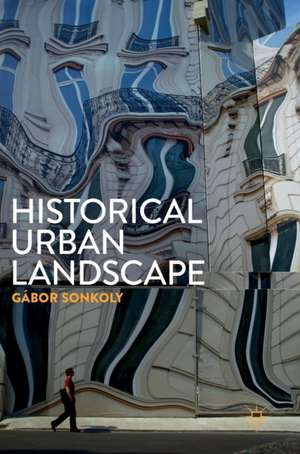Historical Urban Landscape
Autor Gábor Sonkolyen Limba Engleză Hardback – 19 ian 2017
| Toate formatele și edițiile | Preț | Express |
|---|---|---|
| Paperback (1) | 577.87 lei 6-8 săpt. | |
| Springer International Publishing – 13 iul 2018 | 577.87 lei 6-8 săpt. | |
| Hardback (1) | 582.12 lei 6-8 săpt. | |
| Springer International Publishing – 19 ian 2017 | 582.12 lei 6-8 săpt. |
Preț: 582.12 lei
Preț vechi: 684.84 lei
-15% Nou
Puncte Express: 873
Preț estimativ în valută:
111.40€ • 115.88$ • 91.97£
111.40€ • 115.88$ • 91.97£
Carte tipărită la comandă
Livrare economică 15-29 aprilie
Preluare comenzi: 021 569.72.76
Specificații
ISBN-13: 9783319491653
ISBN-10: 3319491652
Pagini: 189
Ilustrații: XIII, 189 p. 4 illus.
Dimensiuni: 148 x 210 x 18 mm
Greutate: 0.37 kg
Ediția:1st ed. 2017
Editura: Springer International Publishing
Colecția Palgrave Macmillan
Locul publicării:Cham, Switzerland
ISBN-10: 3319491652
Pagini: 189
Ilustrații: XIII, 189 p. 4 illus.
Dimensiuni: 148 x 210 x 18 mm
Greutate: 0.37 kg
Ediția:1st ed. 2017
Editura: Springer International Publishing
Colecția Palgrave Macmillan
Locul publicării:Cham, Switzerland
Cuprins
1. Introduction.- 2. The History of Historic Urban Landscape.- 3. Vienna and The Vienna Memorandum.- 4. History and Cultural Heritage.- 5. Conclusion.
Notă biografică
Gábor Sonkoly is Professor and Vice-dean in the Faculty of Humanities, ELTE University, Budapest, Hungary.
Textul de pe ultima copertă
This book uses the Historic Urban Landscape - the most recently codified notion of international urban heritage conservation - to demonstrate why it is necessary to demarcate history from cultural heritage and what consequences the increasing popularity of the latter have on history. It also demonstrates how the history of cultural heritage can be constructed as a historical problem. First, the conceptual history of urban heritage preservation – based on the standard setting instruments of international organizations – reveals the fundamental elements of the current concept of urban heritage. Second, this concept, as worded in the HUL approach, is investigated through the analysis of Vienna, which played a crucial role in the establishment of HUL. These examples are used to to show how the evolution of cultural heritage can be constructed as a historical problem.
Caracteristici
Appeals to historians and sociologists of urban history and cultural heritage fields Offers a unique methodological framework for historians and other academics who wish to initiate debate on the role of cultural heritage in their research Provides a systematic analysis that will make the discourses of historians, social scientists, and urban heritage experts on contemporary urban heritage more intelligible
